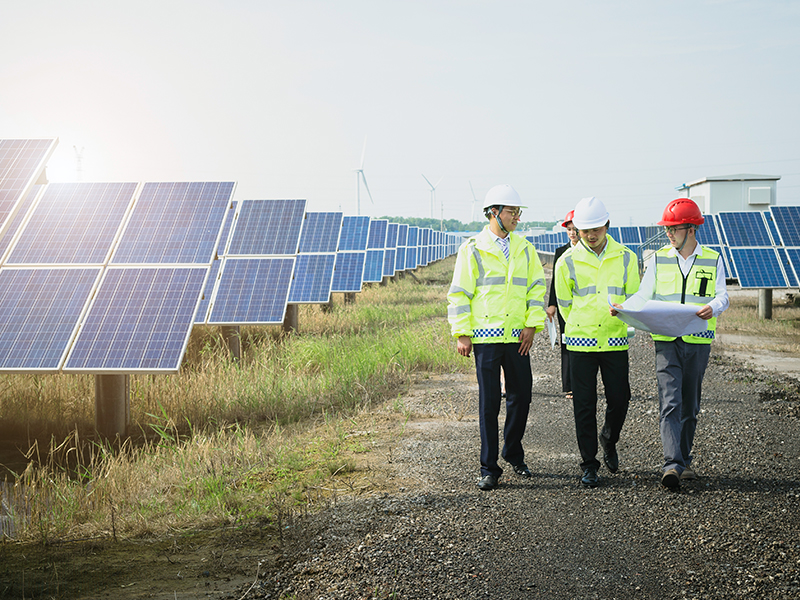Benefit Choose a Policy-Centered Sustainable Energy Degree
JHU’s unique blend of policy analysis, economics, finance, and geopolitical expertise prepares you to lead across global energy markets.
Because Reputation Matters
Our graduates advance to senior roles at top energy companies, consulting firms, and global organizations, and benefit from a 24,000+ alumni network across 175 countries.
Because We Set Industry Standards
Our professors are leading scholars and trusted policy advisors whose work shapes boardrooms, governments, and international organizations with expertise in global energy markets and policy.
Because We Attract Top Students
In every course, you’ll collaborate with peers who challenge your thinking, expand your perspective, and reflect the diverse, international community that defines Johns Hopkins SAIS.
Because Global Markets Need Global Minds
We prepare students to navigate the complexities of sustainable energy by combining interdisciplinary coursework, policy relevance, and real-world insight.
Take the Next Step Now
Earn your master’s degree part-time in just 21 months — no GRE/GMAT needed.
To learn more about the MA in Sustainable Energy (online) and download a brochure, fill out the fields below, or call +1 443-565-4632 to talk with one of our enrollment specialist.
This program attracts ambitious professionals seeking advanced roles in the energy sector.
Our students arrive with previous professional experience and are seeking to accelerate their career growth. They want to add policy and market analysis to their technical or business expertise and ultimately position themselves for high-level strategic positions. Learn more about the students who chose JHU for their success.
In our classes, you'll find professionals with:
We welcome candidates from diverse backgrounds and take a holistic approach to admissions. There is no minimum GPA or GRE/GMAT requirement.

JHU’s unique blend of policy analysis, economics, finance, and geopolitical expertise prepares you to lead across global energy markets.

Our Washington DC connections place you where policy happens, while our international focus sets you up for success in the world’s fastest-growing energy markets.

The regularly updated curriculum reflects real-time industry needs, thanks to direct input from energy companies and other market leaders.

Your professors are renowned researchers and industry experts who know how to build consensus on complex issues and convert analysis into action.
Earn your master’s degree part-time in just 21 months — no GRE/GMAT needed.
We recognize that pursuing an advanced degree is a significant investment in both time and resources. In an effort to make our program more financially accessible, students admitted to the Master of Arts in Sustainable Energy (online) for fall 2026 are now eligible for a tuition scholarship. This is the first time we’ve extended this opportunity.
Success in global energy markets requires a command of policy and business. The Master of Arts in Sustainable Energy (online) at Johns Hopkins SAIS delivers this powerful combination. Our curriculum builds sophisticated expertise in economics, finance, geopolitics, and quantitative and qualitative analysis.
We designed this program for working professionals who want both excellence and flexibility. Complete advanced coursework online, then strengthen your network during two in-person residencies in Washington DC.
Our graduates thrive because they see the full picture. They can translate policy signals into market opportunities and turn complex challenges into competitive advantages.
Two required in-person residencies in Washington DC frame your degree experience:
Both residencies are an excellent opportunity to network with DC’s sustainable energy leaders and build valuable connections with peers and faculty.
As global leaders push for clean energy solutions, demand for professionals skilled in strategy, governance, and policy continues to grow.
The IEA projects that between 2024 and 2030, the world will add over 5,500 GW of new renewable energy capacity, nearly three times the growth seen from 2017 to 2023. In the US, clean energy jobs rose 4.2% in 2023, more than twice the 2.0% growth of the overall economy, adding around 142,000 new positions (Utility Dive).
Our students can go into these careers:
Energy Auditors
Urban and Regional Planners
Environmental Economists
Industrial Ecologists
Sustainability Specialists
Project Management Specialists
Environmental Compliance Inspectors
Wind Energy Development Managers
Chief Sustainability Officers
Climate Change Policy Analysts
Powered by Lightcast
Energy Auditors
$ 71k per year
Median Salary
386
Job Openings
3,448
Currently Employed
Projected outlook
$ 71k per year
Median Salary
17,969
Job Openings
150,919
Currently Employed
Projected outlook
Urban and Regional Planners
Environmental Economists
Industrial Ecologists
Sustainability Specialists
Project Management Specialists
Environmental Compliance Inspectors
Wind Energy Development Managers
Chief Sustainability Officers
Climate Change Policy Analysts

Professor’s Perspective
The climate crisis demands action, and sustainable energy is key to the solution. This degree equips you with the knowledge and analytical skills to address global challenges in public and private sectors alike.
John Banks, Professor, Johns Hopkins SAIS
The dual Washington DC residencies serve as cornerstones of the program, giving you direct access to the epicenter of energy policy innovation. These carefully structured experiences put you in the room with industry leaders and policy architects while building connections that can define your career trajectory.
The first residency sets you up with specialized research skills and industry connections essential for completing your capstone project, while the second celebrates your achievements among established energy leaders. They serve as a powerful complement to your online education.
SAIS Career Services provides personalized job search assistance, one-on-one career coaching, targeted interview preparation, and invitations to DC-area events, including career treks, pitch competitions, and high-level networking opportunities.
We have extensive recruitment channels, with nearly 200 employers visiting Johns Hopkins in person and online annually to present their organizations and recruitment processes.
JHU also offers more than 35 job skills courses annually that focus on highly marketable skills such as intros to R or Python, project management, crafting your “elevator pitch,” getting a security clearance, and more. These courses are completely free for current students and alumni, with most held on campus and some available online.
Other career advantages include:
Our sustainable energy master’s program takes a broader approach than many renewable or clean energy degrees. Instead of focusing narrowly on specific technologies such as solar or wind, we incorporate the complete energy landscape. This includes a range of traditional and emerging energy sources.
This benefits our students because effective energy transitions require knowledge of the intricate relationships between existing infrastructure, policy frameworks, market dynamics, and new innovations. Our graduates excel at creating implementable energy solutions that account for political realities, economic constraints, and technical possibilities, a skill set increasingly valued by organizations driving sustainable energy transformation.
Visit our FAQ page for more answers to frequently asked questions.